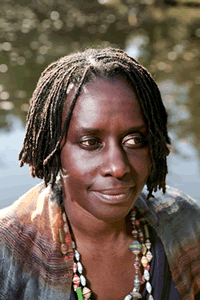Peace & Reconciliation: By Juliane Okot Bitek

Peace & Reconciliation

By Juliane Okot Bitek
Perhaps peace is a kind of silence of the heart, a heart silence, like the company of my shadow, ever silent, ever with me. It has been said that your shadow leaves when you die. If peace was like my shadow then it would fly away when I died and then my body would remain outside the boundaries of peace and then what?
Perhaps peace is quiet, not silent, like a sleeping child but that only works as long as the child remains asleep but who wants to have a child that remains asleep all the time? Peace is a useful construct but all it is is only one aspect of many ways to be in the world. Peace must not stop us from being angry at the continuing injustice around us. It must not stop us from being indignant at the oppression that takes place world over, in our names. Peace must not be the excuse that stops us from protesting against world power or having solidarity with others who seek freedom from the wilful damage against young people, against sexualities that are not ours, against religions we might not practice, against those who speak languages or have a darker shade of skin from ours. Peace is not ignorance. Peace is not not knowing; it is not turning our back on work that needs to be done because protest may not be seen to be peaceful, because challenging state oppression may not be seen to be peaceful.
The kind of peace I seek is a solidity of the heart, an internal confidence in the work required to against all suffering, against wilful damage of our environment and against injustice. Peace is knowledge that solidarity exists; there are like-minded people who work for a better world. Peace is knowing that we each are not alone. Peace therefore is the opposite of loneliness; peace is knowing that the work has a history and will continue when we're long gone. It is not forgetting the nightmares or ignoring the cries of people around us.
And so how do we reconcile with what we know about and what is being asked of us? What do we do with the pressure to find reconciliation between the oppressors and the victims? What is this need to find reconciliation with the past? How do we reconcile with political terror, with colonialism, with slavery that isn't considered the perpetual terror that takes a hold of us, night and day, even as we're asked to seek peace within and reconcile, reconcile, reconcile. Reconcile with what?
Reconciliation sounds like a journey towards balance, towards a place where we're more equal, where we all have a voice in creating stories of a future together. Reconciliation seems to suggest a journey backwards to a place before now, before the hurt, before the time of suffering, when there was a conciliation. What if there wasn't one? What if there was never a time when we lived in a conciliatory way with the ones that oppress us today? What if we were the oppressors before we lost ground and became the victims? What are we reconciling? For what? By when? And why? We reconcile, like accounting, numbering for and against the sins that we have propagated against and by us. We reconcile, like accounting a divided sheet, one side the possibilities and the other the nightmares that we do not want to return to. We reconcile but won't yet have a conversation about reparations, about return of land, about the poisoning our water, about resources that are hauled out as we hold out our hands for mosquito nets and the drippings from well meaning foreigners who send us money to build a school, a borehole, a tarmac road. We reconcile what we know with what we're yet to know, and find a way through that. We reconcile what we think, with what we have yet to learn. We reconcile what we remember with what they're going to tell us about what we should remember. Re-conciliate what?
Yesterday we emerged as child soldiers, sex-slaves and guerillas. Yesterday we were victims of a long, long war. Yesterday the vultures landed and made quick work of our bodies, blood and suffering. Today the vultures have retired in the suburbs of California waiting for the next blood letting but still find threads of our experiences to entertain the hordes who pay for stories from Hollywood. Today we're the source of statistics, how to do worse, how to suffer and occasionally, how it is that we're resilient and strong in the face of all that pain. A recent movie, ExMachina, celebrates and ponders the possibility of love between what we have created and who we are. Acholi drums, Acholi drums in the background of that film reminds me that I must reconcile with my own identity even though I have been displaced and misplaced in this place and in this history. If there's a peace and reconciliation to be made, it's that I must connect with who I am and with those who journey towards a place beyond innocence and ignorance but towards justice and a space where we can share our nightmares and dreams.
Published at June 16, 2016
